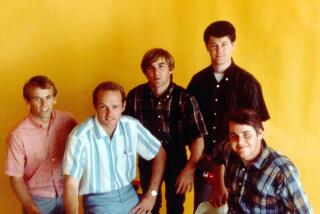Beach Boy Remains an Enigma in ‘Biography’
- Share via
The shooting star arc of Brian Wilson’s unsettled life has made an indelible impact on American music. Before the Beatles, there were the Beach Boys, and the music Wilson created in the ‘60s for the seminal California band remained a principle defining influence upon rock, despite the power of the decade’s invasion of British music.
But Wilson was--and is--a complicated figure. His life lived publicly, his successes, failures, illnesses, addictions and relapses announced in the media with considerable frequency, he has nonetheless remained enigmatic. A&E;’s “Biography:
Brian Wilson: A Beach Boy’s Tale,” an expansive, two-hour documentary, makes a determined effort to clear away the murkiness, to illuminate the life of an artist it describes with frequency as a “genius.”
While it appears to properly position most of the relevant factual data, however, Wilson remains elusive. If, at the close of the program, we have greater insights into the personal and professional stresses that contributed to the various emotional breakdowns, into the tribulations of success and the pressures of the recording industry, we still know too little about how Wilson was able to transform those dark currents into such often optimistic, always compelling music.
The program, which is narrated by “Biography” series anchor Harry Smith, is structured around a series of interviews with Beach Boys Al Jardine and Bruce Johnston, wife Melinda Wilson and former wife Marilyn Wilson, daughters Carnie and Wendy Wilson, biographer Davis Leaf, manager David Anderle, songwriters Van Dyke Parks and Tony Asher (both of whom collaborated with Wilson), and numerous other musicians and friends. Interspersed with the interviews are snatches of performances--many previously unheard--of more than two dozen Beach Boy tunes, including a particularly touching solo rendering by Wilson of the powerful “Surf’s Up.”
Notably absent (except for brief clips from much earlier interviews) are Wilson’s cousin and close Beach Boys associate Mike Love, and controversial psychotherapist Eugene Landy.
Despite their absence, the program does not avoid dealing with the complicated creative and financial differences between Wilson and Love, as well as with the astonishingly controlling, Svengali-like relationship with Landy. It details, in addition, the impact of Wilson’s obsessive and similarly manipulative father, Murray Wilson; the years lost to drugs and emotional isolation; the detachment from and eventual reconciliation with his two daughters; and the heartening aspects of Wilson’s recent return to music-making. But it only touches on the deaths of Carl and Dennis Wilson.
At its heart, however, it is really the story of an enormously talented innocent attempting to survive in a world that was almost always moving too fast. And if one fact becomes crystal clear in the documentary, it is that Wilson was only truly alive when he was making music. The devil was in the other details of his life.
He says it best himself near the close of the program, when he concludes, “The whole world could go away when we were singing on microphone. The world could disappear. It was just amazing.”
*
* “Biography: Brian Wilson: A Beach Boy’s Tale,” airs Sunday at 9 p.m. on A&E.;
More to Read
The biggest entertainment stories
Get our big stories about Hollywood, film, television, music, arts, culture and more right in your inbox as soon as they publish.
You may occasionally receive promotional content from the Los Angeles Times.








